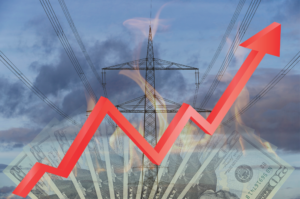At Common Sense America, we believe in the free market. Competition drives better service, lower prices, and more innovation. It puts power in the hands of consumers and holds big players accountable.
But in the energy sector, that basic principle is being trampled by utility monopolies that use government-backed privileges to eliminate competition, silence consumer choice, and lock in guaranteed profits.
For years, utility companies have gamed the system to line their own pockets, not through better performance or innovation, but through regulatory loopholes and monopoly power.
Investor-owned utilities are legally guaranteed a fixed rate of return on capital expenditures. That means the more they spend, the more they profit. So, what do they do? They flood regulators with requests to raise rates, often citing the need to “modernize” the grid or prevent outages. But much of that spending has little to do with real improvements and everything to do with juicing profits.
Worse still, because these companies enjoy monopoly status, ratepayers have no ability to shop around or demand better. No competition means no accountability.
Across the country, utilities are lobbying for even more monopoly control—trying to convince lawmakers to let them own new power plants outright and charge customers higher rates to fund them. They want to build power plants, control generation, deliver electricity and rake in guaranteed profits at every stage. That’s not a free market—that’s a government-protected monopoly empire.
Let’s be blunt: this is a conflict of interest. When utilities are both the builder and the bill collector, the incentive isn’t to deliver cheap, reliable power—it’s to spend as much as possible and pass the cost on to you.
Why would they do this? One word: Profit.
We’re not against profit but we’re for earning it through competition. But what’s happening now is something else entirely.
Look at Exelon, the Chicago-based utility giant. It promised its Wall Street investors it would increase earnings every year through 2028—not by competing in the open market, but by spending your money on infrastructure that you are forced to pay for. That’s how they keep profits flowing and shareholders smiling.
Since 2020, Exelon’s Baltimore Gas & Electric has raised electricity delivery costs by 30% and natural gas by 50%. In Chicago, its ComEd subsidiary has pushed through $606 million in rate hikes over four years. Meanwhile, families and small businesses are being squeezed tighter and tighter.
Another example is PPL Electric Utilities, which operates in Pennsylvania. The company will spend $1.8 billion on power lines, transformers and other equipment, more than twice what it spent in 2023. The logic is simple. The more PPL spends, the higher profits it can return to its shareholders. But it begs the question: Is this spending actually improving service for its 1.4 million customers?
Anyone who pays a utility bill. That’s millions of people across Maryland, Pennsylvania, New Jersey, Illinois, and beyond. In fact, 80% of Americans say they feel powerless to influence what they pay for electricity.
And it’s not just about your monthly bill. When electricity rates surge, businesses think twice before opening shop in your state. Rising utility costs drive away private-sector investment and cost local economies the jobs and growth they need.
We must restore competition and transparency. That means:
- Stopping efforts in state legislatures that expand monopoly control over power generation.
- Demanding public scrutiny of every rate hike and new capital investment scheme.
- Creating avenues for market competition—whether through supplier choice, third-party generation, or performance-based accountability.
Utility monopolies should not be allowed to raise rates just to pad their profits and satisfy Wall Street. The only way to break this cycle is to return to the basic American principle that made our economy the envy of the world: free markets work. Monopolies don’t.
It’s time to stop the utility power grab before they take even more from hardworking Americans.



